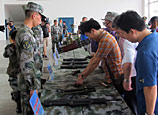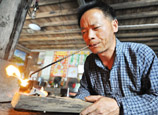
Chinese PC manufacturing giant Lenovo said in a statement Wednesday that it currently has no further comments on the reported bans of its products by intelligence agencies in five developed countries.
"We need to point out that the Australian Department of Defence denied the accusation Tuesday on its official website," Zhao Zhipan, spokesperson of Lenovo, told the Global Times.
The Australian Department of Defence on Tuesday clarified that the Saturday report of the Australia-based newspaper Financial Review, which said they had banned the use of Lenovo computer equipment on its networks, is "factually incorrect."
The report alleged that the intelligence and defense services of Australia, the US, the UK, Canada and New Zealand have all banned the use of Lenovo, the largest personal computer maker in the world, in their networks as they are easy to be hacked due to the existence of a hardware "backdoor."
The newspaper cited anonymous intelligence and defense sources in Australia saying that there is a "written ban" on Lenovo computers for "classified" networks, which has been in place since the mid-2000s.
There is no ban by the department on Lenovo or their computer products for either classified or unclassified systems, reads the Tuesday statement from the department.
Lenovo's spokesperson told the Global Times earlier that it is paying close attention to the issue but, except for the statement, it had nothing further to disclose as of late Wednesday.
Lenovo is considered to have official background as the Chinese Academy of Sciences owns a decent portion of its stake.
Similar "safety threat and spying" accusations have also been leveled at Huawei Technologies, a Shenzhen-based telecommunication manufacturer, which the company has repeatedly denied.
Huawei was excluded from tendering for the Australian National Broadband Network on July 23.
















 Man commits suicide, rescued by his wife in NE China
Man commits suicide, rescued by his wife in NE China


![]()
